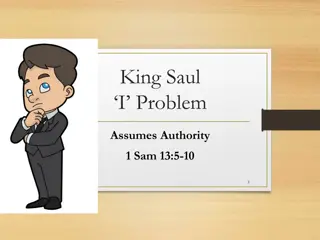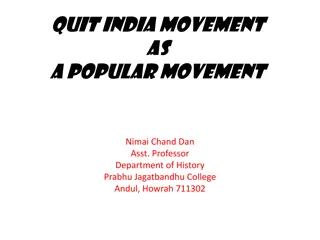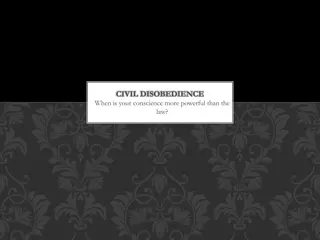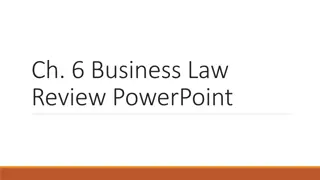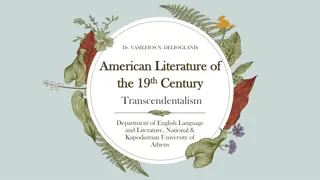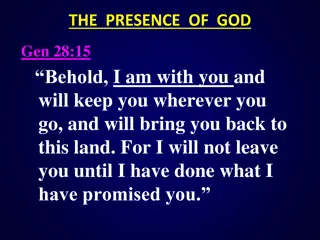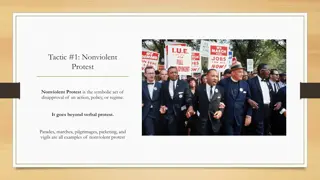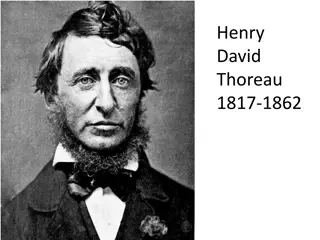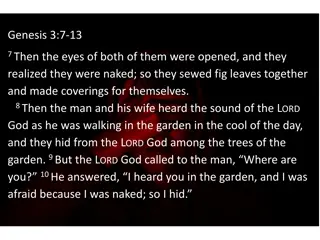Understanding Civil Disobedience Through Thoreau's Perspective
Explore Henry David Thoreau's views on civil disobedience by delving into key passages from his writing, dissecting his ideas on government authority, the basis of a free society, and the irony he points out about his night in jail. Engage in group discussions, analyze DOK levels of questions, and uncover insights into Thoreau's definition of civil disobedience.
Download Presentation

Please find below an Image/Link to download the presentation.
The content on the website is provided AS IS for your information and personal use only. It may not be sold, licensed, or shared on other websites without obtaining consent from the author. Download presentation by click this link. If you encounter any issues during the download, it is possible that the publisher has removed the file from their server.
E N D
Presentation Transcript
DO THIS NOW Sit in assigned groups Read through DOK descriptors Note any questions you have Be prepared to share with the class
DOK Labeling In your groups discuss and label the DOK level of the following questions: Based on lines 88 89, what is the basis of a free and enlightened state? How does this related to his overall ideas? Based on lines 33 51, what is the irony Thoreau points out about his night in jail? Explain the irony. In the final paragraph, what does Thoreau think would make the authority of the government just ?
How does Henry David Thoreau define civil disobedience?
Henry David Thoreau American essayist and philosopher 1817 -1862 Famous for transcendentalism Emphasis on simple living and communing with nature Famous for civil disobedience In July 1846, Thoreau was arrested because he refused to pay a tax to the state. He refused to pay the tax because he was against the US s war with Mexico. He believed the war was an excuse to expand the region of America where slavery was allowed. He wrote Resistance to Civil Government as a response to the night he spent in jail for tax evasion.
Question One Based on lines 8 -25 how does Thoreau s description of the tax-gatherer support his ideas about civil disobedience?
Model DOK 3 Answer Thoreau describes the tax gatherer as the agent of the government, who chose this position. Since it is with men and not with parchment that I quarrel the tax gatherer is his only contact with the government and therefore the means for his civil disobedience. His refusal to pay his taxes is his means to refuse to support the government he disagrees with, and allows him to not be like his neighbors and their gross inconsistency of saying they don t support the war but they still pay their taxes.
Question Two How does this part of the passage, I know this well slavery in America done well forever (lines 20 -25) support his central idea? What does it connect to from the text?
Question Three Based on lines 33 51, what is the irony Thoreau points out about his night in jail? Explain the irony.
Model DOK 2 Answer The ironic statement is that in jail, Thoreau was more free than the townsmen. They are locked in their hypocrisy, but his thoughts and their power can t be stopped by a jail cell, making him more free. (The people must break through a still more difficult wall to be as free as Thoreau.) He also says I alone paid my tax which is ironic since he didn t pay his tax. But he is the only one standing up for his beliefs, so jail is his way of paying his tax with a higher purpose than his neighbors who support an unjust war.
Question Four Based on lines 52 54, what is the state armed with? How does this support an earlier assertion in his essay?
Question Five How does Thoreau s night in jail affect his relationship with the government? Support your answer with textual evidence.
Question Six How does the figurative language (extended metaphor) in lines 61 65 develop Thoreau s point of view of his relationship to the state government ?
Question Seven Based on lines 66 -79, how does Thoreau describe the changes in the town when he gets out of prison?
Model DOK 1 Answer He says, A change had to my eyes come over the scene greater than mere time could effect meaning that it is a change in perspective rather than actual changes in the town. The people haven t changed; his view of the people has changed, seeing them more clearly.
Question Eight What does Thoreau mean by the metaphor used in lines 71 and 72 (friendship summer weather)?
Question Nine How does Thoreau s description of those around him develop his central idea of ethics?
Question Ten In the final paragraph, what does Thoreau think would make the authority of the government just ?
Question Eleven Based on lines 88 89, what is the basis of a free and enlightened state? How does this related to his overall ideas?
Question Twelve Based on lines 80 88, what is his view of democracy? How does this support his main idea?
Culminating Question What is the ideal government according to Thoreau? Use textual evidence to create a developed answer.
Homework Finish Close Read Complete Socratic Seminar Preparation for Next Class
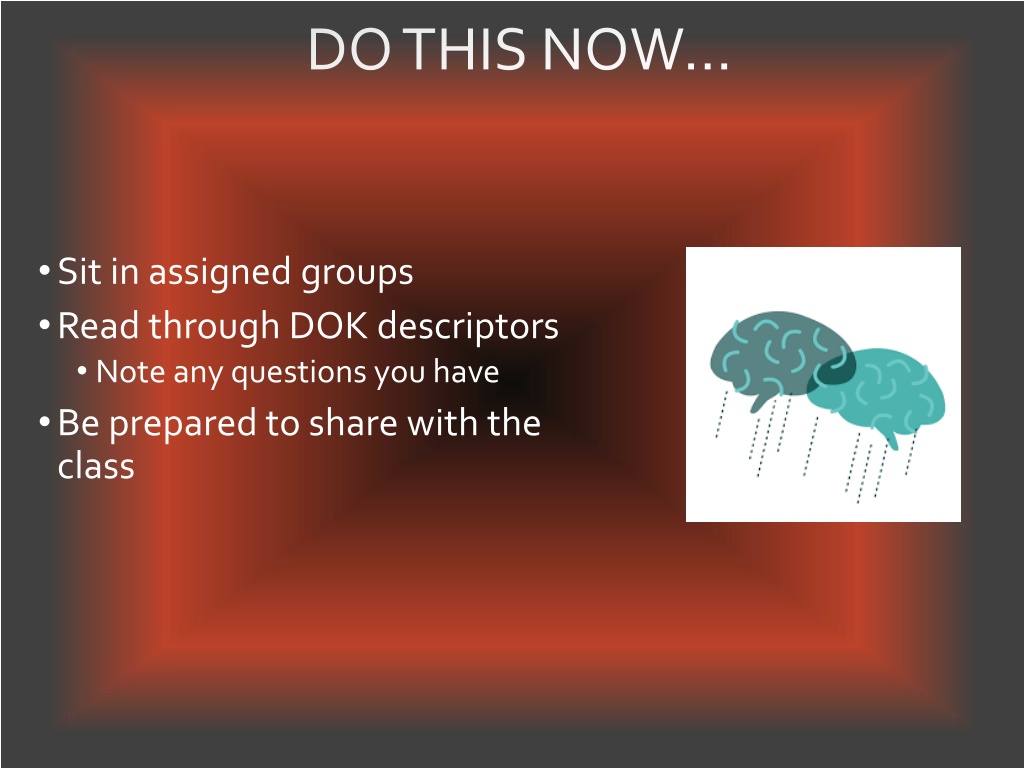

![❤[PDF]⚡ Civil War Talks: Further Reminiscences of George S. Bernard and His Fel](/thumb/20551/pdf-civil-war-talks-further-reminiscences-of-george-s-bernard-and-his-fel.jpg)





